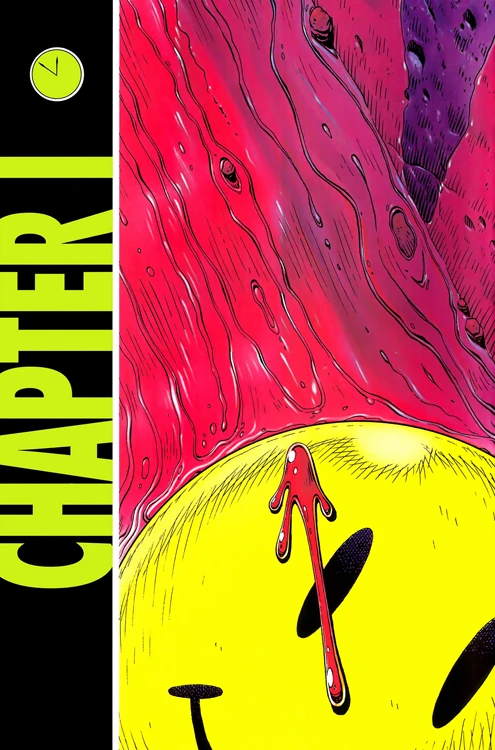So in this fine year of 2015, I read Watchmen by Alan Moore and Maus: My Father Bleeds History by Art Spiegelman. Two very different graphic novels but both were deep and invoked a variation of emotions in me.
Quis custodiet
ipsos custodes
Who watches the watchmen?
Watchmen, which I read the majority of while in Colorado to visit my brother, wasn't what I expected. I thought it'd be an easy, enjoyable read about superheroes doing superhero things: fighting an archetype villain, falling in love with a Mary Sue, blah, blah. I've never read a graphic nov
 el about superheroes before, just saw the movies, so my predispositions were trampled almost on the first page.
el about superheroes before, just saw the movies, so my predispositions were trampled almost on the first page.This isn't a story about superheroes. It's the story of the ghosts, the remains, of what once were superheroes. In Watchmen, heroes are labeled as vigilantes and are forbidden from causing their heroic discourse. And while good can't fight evil in its usual tropes, we do have looming doom throughout the story. The Cold War is running its course, and America isn't reacting well to Russia's indirect threats. Tensions plague the citizens, whether they have a history with hero-dom or not.
All of the characters are real in the fact that all of them are flawed. Dr. Manhattan is calloused and apathetic. Rorschach is a blatant sociopath. No one is perfect in Watchmen, not even if you're a superhero.
 What I think lead me to my realization of the raw power of this graphic novel is Chapter IV. Here is Dr. Manhattan's narrative, from his days when he was still human to when he suffered the accident that forever changed his life to his isolation on Mars. Dr. Manhattan pushes the idea that time is nonexistent in the same manner Kurt Vonnegut does in Slaughterhouse-Five. We jump from 1966 to 1959 to 1985. And while both distorted and odd, the formatting of this chapter laid down the basis of Dr. Manhattan's approach to life. We get closer to understanding why Dr. Manhattan is so unaffected by humanity and its emotions. It is probably one of the most beautiful chapters I've ever read.
What I think lead me to my realization of the raw power of this graphic novel is Chapter IV. Here is Dr. Manhattan's narrative, from his days when he was still human to when he suffered the accident that forever changed his life to his isolation on Mars. Dr. Manhattan pushes the idea that time is nonexistent in the same manner Kurt Vonnegut does in Slaughterhouse-Five. We jump from 1966 to 1959 to 1985. And while both distorted and odd, the formatting of this chapter laid down the basis of Dr. Manhattan's approach to life. We get closer to understanding why Dr. Manhattan is so unaffected by humanity and its emotions. It is probably one of the most beautiful chapters I've ever read.Through amazing characters and a powerful story, Watchmen instantly raised the bar for all graphic novels. A bar Maus was close to meeting.
I found Maus on my friend's bookshelf and she immediately encouraged me to read it, and I did. All in one day. Which isn't much because it isn't as nearly as long as Watchmen and I only read the first volume. Maus, plain and simple, is a story about the Holocaust and its lasting effects on those who did or did not first handedly suffer its tragedies. Its drawings portray Jews as mice and Nazis as cats, but the fun nature of this graphic novel ends there. This book is serious and dark but it makes sense because the Holocaust was. It's well-written, the dialogue is extremely realistic and so are the relationships between the characters (which makes sense since I believe this is somewhat a biography within an autobiography). I'm eager to read the second volume, but while this graphic novel was impressive, Watchmen triumphs as the better of the two graphic novels I read this year.
Watchmen 5/5
Maus 4/5

No comments:
Post a Comment